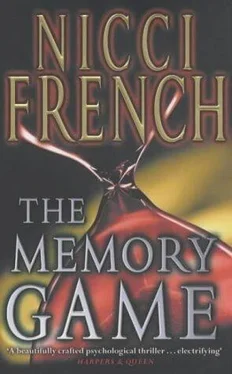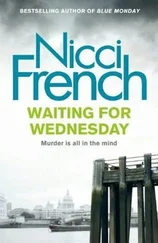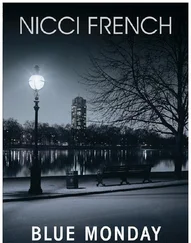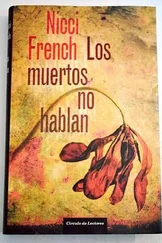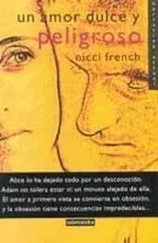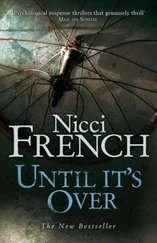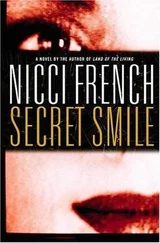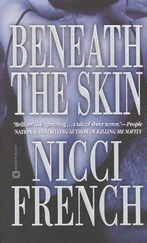Nicci French - The Memory Game
Здесь есть возможность читать онлайн «Nicci French - The Memory Game» весь текст электронной книги совершенно бесплатно (целиком полную версию без сокращений). В некоторых случаях можно слушать аудио, скачать через торрент в формате fb2 и присутствует краткое содержание. Жанр: Триллер, на английском языке. Описание произведения, (предисловие) а так же отзывы посетителей доступны на портале библиотеки ЛибКат.
- Название:The Memory Game
- Автор:
- Жанр:
- Год:неизвестен
- ISBN:нет данных
- Рейтинг книги:4 / 5. Голосов: 1
-
Избранное:Добавить в избранное
- Отзывы:
-
Ваша оценка:
- 80
- 1
- 2
- 3
- 4
- 5
The Memory Game: краткое содержание, описание и аннотация
Предлагаем к чтению аннотацию, описание, краткое содержание или предисловие (зависит от того, что написал сам автор книги «The Memory Game»). Если вы не нашли необходимую информацию о книге — напишите в комментариях, мы постараемся отыскать её.
The Memory Game — читать онлайн бесплатно полную книгу (весь текст) целиком
Ниже представлен текст книги, разбитый по страницам. Система сохранения места последней прочитанной страницы, позволяет с удобством читать онлайн бесплатно книгу «The Memory Game», без необходимости каждый раз заново искать на чём Вы остановились. Поставьте закладку, и сможете в любой момент перейти на страницу, на которой закончили чтение.
Интервал:
Закладка:
about The Memory Game
This was your first book as a team. Why did you decide to write together?
Nicci: It’s hard to say now (hard to remember) how something that for a long time had been a vague and slightly mad idea became a reality. Because when we met we were already writers – and obsessive readers – we had talked about what made a ‘voice’ in a book, and wondered whether it would be possible for two people to create one, seamless voice. We used to say that one day, when we had time, we would try to write a book together, to see if it was possible. And then one day – when we had no time, no money, four tiny children, a life of clutter and chaos – we came across this idea for a book that seemed new and exciting. And we just thought that if we were ever going to do it, now was the time. It began almost like a literary experiment, and then quite soon it took us over.
So how did you actually go about it?
Sean: We spent weeks and months around the kitchen table with glasses of wine and gin and tonics sketching out the story and even, in the case of The Memory Game , drawing a detailed map of the Martello property. But when it came to writing the book, we wrote separately. One of us would write a section, then hand it to the other who was permitted – in theory, at least – to cut, add, rewrite without fear of retribution.
Nicci: It sounds simpler than it is, less messy and quarrelsome. We’re often asked if we argue and the answer is that of course we do. We argue quite a lot (actually, I argue and Sean doesn’t, which is extremely irritating). But it’s not over the things you’d expect – not over large ideas, or over the changing of words. It’s more like a version of marital bickering: couples rarely argue over big issues, but over things like who does the washing up. More than arguing, however, we struggle and disagree with each other, and I’ve come to think that our novels are born out of those disagreements: we often want to write about the things we can’t quite settle on, the things that bother and disquiet us and we can’t let go of, but come back to over and again.
We thought, after The Memory Game, that we’d found a way of doing it, but that turned out to be nonsense. Maybe writing can never be easy and maybe it never should be. There are days when things go right, and then there’s a kind of magic about the way that writing leads you, and you follow it in order to find out what you are thinking – and then there are days when it’s painful and slow and your head feels like glue. We have very few rules together. One is that we never tell anyone – not even our family, not our children who are always asking, who wrote which bit (people try and guess and they’re right about fifty per cent of the time). The other is that we’ll change each other’s words privately, not face to face, otherwise it’s brutal.
Did you decide in advance who would write which bit – for instance, who would write about recovered memory and the therapy sessions?
Nicci: Absolutely not. We both do all the research (in this novel, and in all the subsequent ones), and then whoever’s turn it is to write will do so. It’s imperative that we each own every bit of the book – every piece of research, every word that’s written.
Why did you choose the name Nicci French?
Sean: We were always felt the book should be published under a single name. We felt that two names on the cover are a distraction – when you read fiction, you want to hear a single voice talking to you. The Memory Game had a female narrator, so it seemed natural to choose a female name. We played around with lots of possibilities but in the end we just gave up and contributed a name each. The only other name I remember, which we quite liked and everybody else hated, was ‘Alice London’. As a private joke, we reversed one of the ‘n’s and made Alice Loudon the heroine of our third book, Killing Me Softly.
There’s a lot in The Memory Game about families – is any of that autobiographical?
Sean: Since this is a family history featuring crimes varying from murder to incest and culminating in two prison sentences, we were rather alarmed that our families claimed to recognize themselves in the book.
Nicci: When our families first read it, Sean’s thought it was based on them and on his crowded summers in Sweden with all his cousins, and my family thought it was based on them. Both of them, for instance, recognised the mushroom hunt at the start of the novel – because both Sean and I had experienced that. Part of the impulse behind the novel was our shared sense that every close, happy family is also unhappy and full of secrets, and that memory is unreliable, slippery and seductive. The past is a shadowy country; you can get lost there.
the recovered/false memory controversy
In the early 1990s reports began to emerge in the United States of horrific crimes. Patients undergoing analysis were recovering memories of horrific abuse committed against them years earlier in childhood. These ranged from sexual abuse by close relatives to baroque accusations of satanic rituals and human sacrifices. Families were torn apart by the revelations and there were even arrests, convictions and long jail sentences based solely on the evidence of these recovered memories. There then ensued a ferocious battle between those – mainly therapists – who insisted that the victims must be believed and those who doubted the basic trustworthiness of recovered memory.
We came across the controversy in 1994 and we had the dual reaction that is perhaps characteristic of writers. We were shocked by the suffering involved and also saw it as compelling material for a thriller. We had a feeling of urgency also, because we thought we had better get a move on, because other people might have the same idea.
As it turned out, the part of the subject that most engaged us was not the subject of sexual abuse but the possible manipulation of the relationship between patient and therapist.
The controversy seems to have passed into history now. The decisive weapons against the therapists who specialized in recovering memories proved to be not dissenting arguments but, as so often, the financial penalties. These took the form of litigation from their damaged patients and the refusal of the medical insurance companies to pay for the therapy.
Even so, some of the factual books on the subject are still well worth reading. Remembering Satan by Lawrence Wright, an account of satantic abuse accusations in a small American town, reads like a thriller in its own right. Victims of Memory by Mark Pendergast is a brilliant, intensely painful account of the subject by a writer who was himself the subject of unfounded accusations. Making Monsters: False Memories, Psychotherapy and Sexual Hysteria by Richard Ofshe and Ethan Waters gives a lucid account of the controversy. The Memory Wars by Frederick Crews joins his analysis of the subject with a devastating critique of the legacy of Sigmund Freud.
top tens
Funes the Memorious by Jorge Luis Borges. The great story of a man cursed by an inability to forget.
The Go-Between by L. P. Hartley. ‘The past is a foreign country. They do things differently there…’
In Memoriam by Alfred, Lord Tennyson. The greatest work of poetic mourning in the language?
In Search of Lost Time by Marcel Proust. Is the meaning of life to be found not outside, but in our own memories? About ten times as long as any other novel and about a hundred times as good.
The Man Who Mistook His Wife for a Hat by Oliver Sacks. Understanding the brain through the extraordinary ways it can go wrong – including the ‘lost mariner’, whose short-term memory has been destroyed, trapping him in an eternal, ephemeral present.
Читать дальшеИнтервал:
Закладка:
Похожие книги на «The Memory Game»
Представляем Вашему вниманию похожие книги на «The Memory Game» списком для выбора. Мы отобрали схожую по названию и смыслу литературу в надежде предоставить читателям больше вариантов отыскать новые, интересные, ещё непрочитанные произведения.
Обсуждение, отзывы о книге «The Memory Game» и просто собственные мнения читателей. Оставьте ваши комментарии, напишите, что Вы думаете о произведении, его смысле или главных героях. Укажите что конкретно понравилось, а что нет, и почему Вы так считаете.
